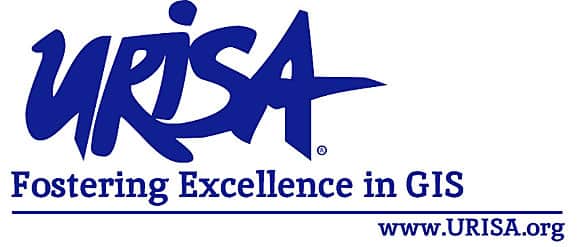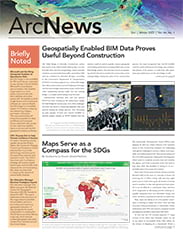When I think back to the early days of my geospatial career, I remember feeling overwhelmed by all the things I could do with my GIS degree. The industry has grown extensively since I graduated from college in 2014—and continues to do so. Just in the last two years, awareness of geospatial technology and analysis has flourished, largely due to their use in monitoring the COVID-19 pandemic.
With the applications of geospatial technology continually increasing, there will likely be more budding geospatial practitioners embarking on new careers, along with other kinds of professionals from a range of industries picking up fresh geospatial skills. So how will you ensure that you stand out from the crowd?

One way is to always be engaged. When you’re first starting out, be proactive about your career and take every chance to build your personal brand and network. Then keep doing that! Don’t let your age or years of experience hold you back from pursuing opportunities that are interesting to you. After all, we are our own greatest advocates.
Here are some ideas for how to consistently stay involved in the GIS community, no matter which career phase you’re in.
Identify Where—and How—You Can Add Value
To effectively build your personal brand and promote yourself while creating new opportunities, it’s important to develop a good understanding of the organizations you belong to, from the school you attended and the company you work for to any professional societies you belong to.
Take time to learn about what each organization does and the roles and responsibilities of the people within it. Do you hear your coworkers discussing a process they’d like to improve? If so, think about how your unique skill sets and qualities might contribute to solving that problem. Then find a way to offer them up. Perhaps your colleagues would like to automate a time-consuming task, and you know a Python script that could help. Tell them about it!
Getting to know your peers—especially people who aren’t on your team or in your department—can be beneficial. While that might sound intimidating, you can take things at your own pace. Start slowly, if you’d like, by challenging yourself to reach out to at least one new person every month or quarter. Learn about what your peers do, their goals, and even the obstacles they face. You might not be able to do anything for them right away, but that information can help you better understand how your work and experience fit into an organization and where you might be able to provide support in the future.
The beauty of the GIS industry is that there are countless ways to apply geospatial technology. A good approach for exploring these options is to familiarize yourself with the people around you—especially those who don’t use GIS in their daily work. Learn what they do and how they do it. That can shed light on why they’re not using GIS. Is it because they don’t know that GIS would work for their situation? If so, that’s something you can help with, so don’t hesitate to share your thoughts.
Put Yourself Out There
Developing connections with others in your network can take time. It can also feel daunting, especially when you’re just beginning your career. But it’s important to build your list of contacts and share the value you bring to an organization.
I remember the first Esri conference I attended, the 2015 Esri Federal GIS Conference. I was completely overwhelmed with the idea of walking around the Convention Center among hundreds of other GIS professionals who all seemed to know each other, introducing myself to try to make connections. Thankfully, with some encouragement from the Esri Young Professionals Network, I spoke with employees from a few companies in the Expo hall. I got comfortable with initiating conversations with potential employers, talking about what I was looking for in a job, and describing what I could bring to their organizations. These conversations opened additional opportunities, and several weeks later I was hired by one of the companies I pursued in the Expo hall.
In the workplace, explore special teams, assignments, and events that your organization offers, including employee resource groups, volunteer days, open positions, upcoming projects, and other means of collaboration. Find ways to get your name out there—perhaps through your company’s intranet or message boards, by participating in an internal group or activity, and even by posting on a career-focused social network like LinkedIn. Be consistent about reaching out and contributing to discussions and activities. It can help you cultivate your internal network; be informed about new opportunities; and, ultimately, get noticed.
If you’re unsure about what to share with your network, don’t be discouraged. I was, too, when I first thought about using my company’s intranet. It’s all right to start small. But it’s also important to think about the information you share and how your colleagues can benefit from it. You could begin by sharing something interesting you learned that has helped you with your work. By posting just one thing, you’ll break the ice and put together your first piece of content. You’ll then start to establish yourself as someone who’s willing to jump in and help out. And if you consistently share helpful information, others will develop trust in you!
Additionally, if your colleagues reach out for support on an issue, don’t hesitate to respond with your ideas—even if you’re not an expert on the subject. Sometimes a new perspective, or someone to bounce ideas off of, is exactly what they need to problem-solve. The content you share can determine what people view you as a resource for and increase the likelihood that they will reach out to you with questions or opportunities.
Remember to Branch Out
It’s easy to become content within an organization, so make sure you keep yourself open to new opportunities. Pursuing activities outside your organization can be very rewarding and even help you grow within your current role.
Consider joining a professional organization, such as the Urban and Regional Information Systems Association (URISA) or another professional organization in your area. These groups encourage their members to engage with other professionals, build leadership skills, volunteer their time, and learn new things that are applicable to a range of projects. For example, URISA offers multiple webinars and training programs, including the Geospatial Leadership Academy, which helps attendees hone both their leadership and technical skills. The URISA Mentoring Network, managed by the Vanguard Cabinet, enables participants to learn from other geospatial professionals while supporting those just coming up in the industry. URISA is also a great place to present your work and build a network that will help you throughout your career.
Regardless of how or where you interact with your network and people in the GIS industry, it’s important to get engaged and stay consistent. Actively participate in activities within your organization and the larger industry. Jump at new opportunities, even if you aren’t sure you’re ready for them. And help others when you can. Take these risks—or risk missing out on great opportunities.



